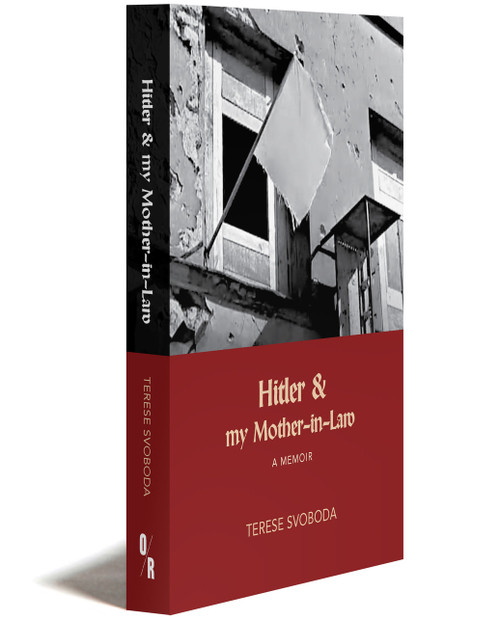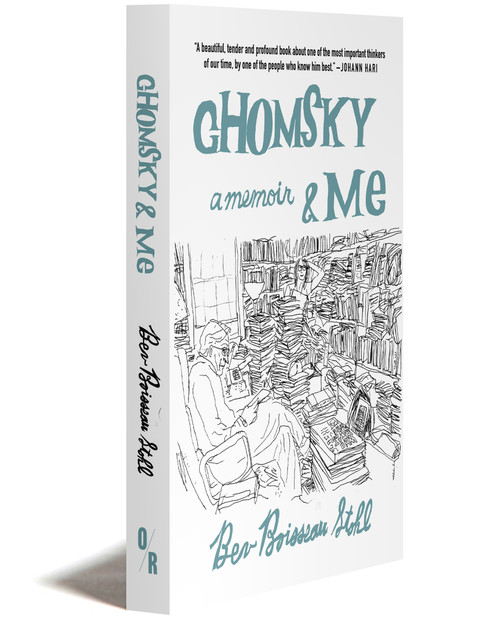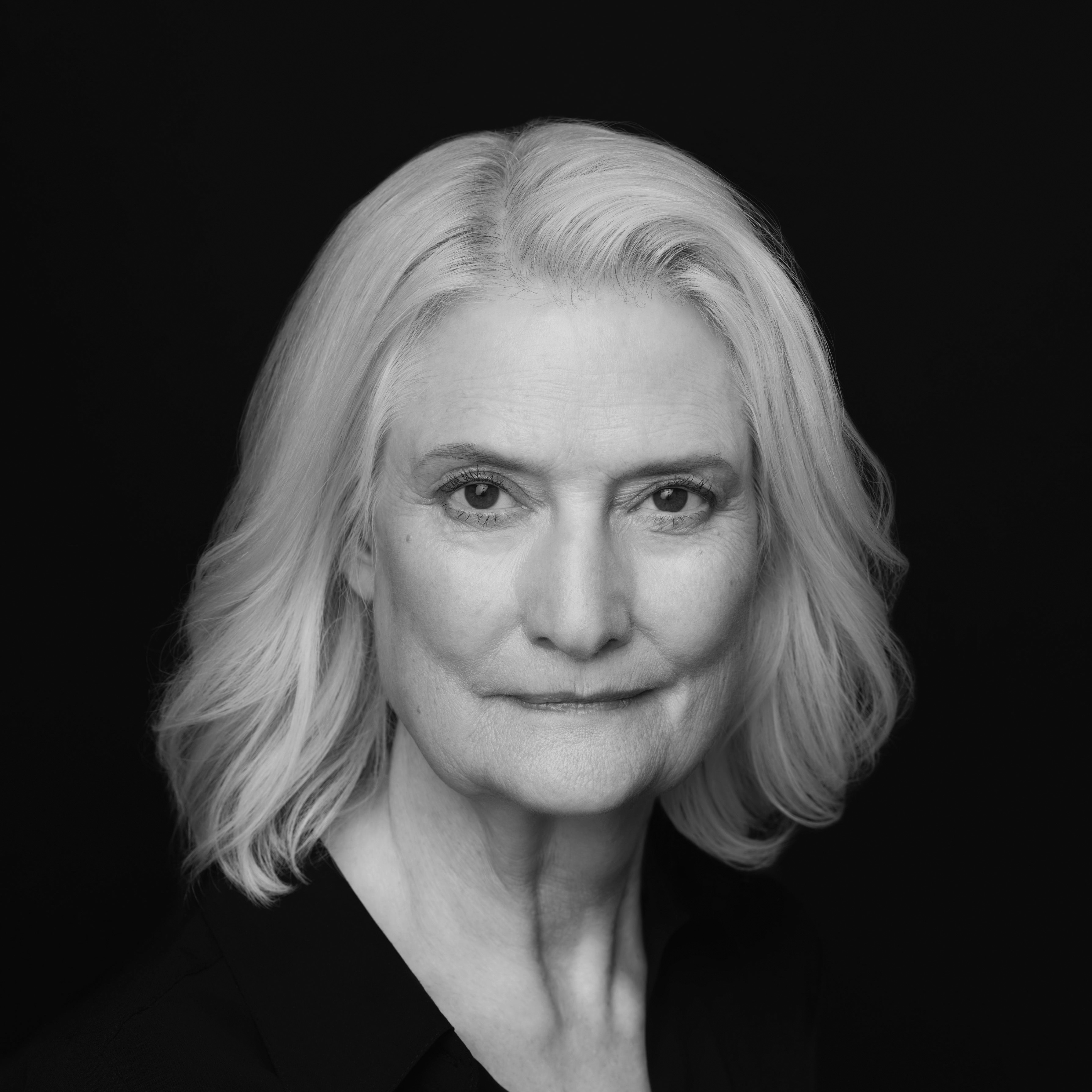Hitler and My Mother-in-Law
“What a bold, vibrant, and intensely original book this is.”
—Joan Silber, author of Mercy“Wit, imagination, and marked acumen about our ongoing preoccupation with censorship, witch hunts, and truth-telling vs. fakery makes this provocative memoir a highly engaging read.”
—Carolyn Burke, author of Lee Miller“A poetic reimagining of a pathbreaking female reporter in a man’s world of war.”
—Kirkus Reviews“Canny, meandering, and revelatory, it's a remarkable family memoir that stretches across major developments of the 20th century while questioning how the truth gets produced. Readers will be riveted.”
—Publishers Weekly“Meticulously researched and thoughtful when looking at the past. This is Svoboda at the height of her power as a writer.”
—Electric LiteraturePRAISE FOR TERESE SVOBODA
“Svoboda's prose is . . . stuffed to the brim—with invention, surprise and the sweaty mystery of whom we get tangled up with, and why.”
—New York Times“Exquisite....[Svoboda] crafts singular depictions of her characters’ inner worlds.”
—Publishers Weeklyabout the bookabout
One of the first women hired by CBS Radio, Pat Lochridge was the only female journalist to cover both the Pacific and Atlantic theaters of WWII. She interviewed Hermann Göring twice, climbed to Hitler’s redoubt at Eagle’s Nest, was a friend of FDR, and the postwar mayor of Berchtesgaden. Sometimes even her four sons questioned the validity of their mother's stories. The first time she met her daughter-in-law (author Terese Svoboda), Pat showed her a photo of herself and a pile of ashes and said the US command had asked her to identify them as Hitler’s. Was she a fabulist, a trailblazer, or was she simply doing her job?
Threaded with dark humor and personal reflection, this memoir explores the stories we inherit and the ones we invent, the official histories we parrot, and the quiet manipulations we accept. From Cold War propaganda and McCarthy-era paranoia to newsroom sexism and the strange theater of postwar art-world politics, Hitler and My Mother-in-Law reveals a life extraordinary—and perhaps crafted. With sharp insight, Svoboda unpacks the contradictions embedded in such a narrative, weaving in reflections on her own experiences in journalism, family, and the uneasy inheritance of truth-through-marriage.
With a voice that is at once skeptical and affectionate, the author navigates the slippery terrain of memory—her own and others’—while wrestling with the impossible task of pinning down truth. In an age of misinformation, spin, and revisionism, this book is an excavation of narrative and memoir itself, and a warning about the seductions of a good story.
“A breathtakingly broad look at the history and significance of war and restitution, art and ownership, family and responsibility, truth and memory.”
—Carolyn Edy, author of The Woman Correspondent, the U.S. Military, and the Press, 1846–1947
About The Author / Editor
Preview
Flying into London's Dorchester Hotel a week later, Pat woke the sleepy night clerk who insisted he had no rooms available. She was not deterred. “But it's for Madame Hemingway,” she said, “and double-talked the sad character a bit until he wasn't sure whether I was Madame, her sister-in-law or whatever, but the name was Hemingway. And sure enough, I was given a delightful suite, complete even to a bowl of fruit and towel-warming racks.” Martha Gellhorn, Hemingway’s wife at the time, was the correspondent's diva: blonde, daring, articulate, an excellent writer and a veteran reporter of the Spanish Civil War, a daunting figure among many talented women. By then she had lost her military credentials for having stowed away on a hospital ship on D-Day, and soon she would have her magazine job stolen from her by Hemingway himself, but being his wife played at least some part in her subsequent reporting opportunities—and comforts. When Pat claimed her suite, however, many in Paris knew Hemingway was living at the Ritz with Mary Welsh of TIME.
Hitler wrote of telling a lie so "colossal" that no one would believe that someone "could have the impudence to distort the truth so infamously.” People would believe the lie only if it were big enough. Hitler's big lie was that Jews had begun a "war of extermination" against Germany, and so Germany had a duty and a right to "exterminate" and "annihilate" the Jews in self-defense. This bit of propaganda closely matches Putin's claim of the Ukrainians attacking the Russians in their country. Trump's losing the 2020 election has also been termed by him “the Big Lie.” The bigger the lie, the bigger the test of allegiance. Will they rebuke him? Hitler's goose-stepping troops and Trump's much reviled tank parade reinforce the most unsubtle of propagandistic memes for the populace: the lie that you are not hungry, your stomach is just angry, march with me and you will be filled. Both the psychologist and the anthropologist have been known to join hands to amplify the myths needed to sanctify the dark corners of propaganda.
Erosion of the truth equals confusion. This is easy to see in those 2020 elections, with fake news, doctored videos, mashup photos and the bewildered disenfranchised electorate, and even more so in 2024. Russians are considered the experts in sowing confusion, having used it to turn the Glasnost—“openness”— of the Perestroika movement into the closed bureaucratic oligarchy of Putin’s reign. Or is singling out the Russians as the culprit just another expression of my own nationalist prejudice? How much have Americans cyber-meddled to influence Russians? Does the New York Times commit the same crime by burying articles about Elizabeth Warren and putting Michael Bloomberg on the front page? The manipulation of the truth can be pervasive and sometimes even unconscious. Why does your mother mention your sister's grade point average so often? Is truth just a matter of who is the better persuader and who's listening when?
Margaret Mead’s credo for visual anthropology was that the camera doesn’t lie, and that if you just let it run, you'll capture what is true of a culture. That is naive: someone decides when to turn the camera on and where to point it. The Heisenberg Principle—that by looking at something, you change it— is also at work. Or, as anthropologist Clifford Geertz theorized, the eye of the viewer sees what it wants, what it has already seen. His book The Interpretation of Cultures launched an attack on The Nuer, written by E. Evans Pritchard, a book that was foundational in the discipline of social anthropology. He accused the study of being truer to the eye of a British anthropologist than to Nuer culture. But what if the proud Nuer did sometimes act like British imperialists? Geertz had not lived with them, not even the brief nine months of my stay.
Believing that editing, effects, and voiceover falsifies footage is a variation on assuming that documentaries contain no truth. Uncut footage is unwatchable to all but the most diligent scholar—whose job it is to create meaning. Scholars and editors interpret, just as journalists, eyewitnesses to unfolding events, choose their words. To paraphrase Geertz again, culture is made up of the meanings people find to make sense of their lives and to guide their actions.
Culture has its own way with truth. After the Cook Islands dance festival, my ex and I waited six months for a boat to take us to Pukapuka, a remote atoll of the Cooks. Touted as having a perfect democracy, the one hundred or so Pukapukans had recently elected someone to choose which program to watch on their single television. National Geographic wanted a photo essay. But the boat never arrived. We waited all those months until I realized I had misinterpreted our government liaison. Every time I asked him when the boat was coming, he promised it was en route—but raised his eyebrows after each reassurance. I didn't know that the eyebrow raise meant no, the boat was not coming, but that culturally he couldn't refuse us. He wasn't lying.
in the media
Hitler and My Mother-in-Law
“What a bold, vibrant, and intensely original book this is.”
—Joan Silber, author of Mercy“Wit, imagination, and marked acumen about our ongoing preoccupation with censorship, witch hunts, and truth-telling vs. fakery makes this provocative memoir a highly engaging read.”
—Carolyn Burke, author of Lee Miller“A poetic reimagining of a pathbreaking female reporter in a man’s world of war.”
—Kirkus Reviews“Canny, meandering, and revelatory, it's a remarkable family memoir that stretches across major developments of the 20th century while questioning how the truth gets produced. Readers will be riveted.”
—Publishers Weekly“Meticulously researched and thoughtful when looking at the past. This is Svoboda at the height of her power as a writer.”
—Electric LiteraturePRAISE FOR TERESE SVOBODA
“Svoboda's prose is . . . stuffed to the brim—with invention, surprise and the sweaty mystery of whom we get tangled up with, and why.”
—New York Times“Exquisite....[Svoboda] crafts singular depictions of her characters’ inner worlds.”
—Publishers Weeklyabout the bookabout
One of the first women hired by CBS Radio, Pat Lochridge was the only female journalist to cover both the Pacific and Atlantic theaters of WWII. She interviewed Hermann Göring twice, climbed to Hitler’s redoubt at Eagle’s Nest, was a friend of FDR, and the postwar mayor of Berchtesgaden. Sometimes even her four sons questioned the validity of their mother's stories. The first time she met her daughter-in-law (author Terese Svoboda), Pat showed her a photo of herself and a pile of ashes and said the US command had asked her to identify them as Hitler’s. Was she a fabulist, a trailblazer, or was she simply doing her job?
Threaded with dark humor and personal reflection, this memoir explores the stories we inherit and the ones we invent, the official histories we parrot, and the quiet manipulations we accept. From Cold War propaganda and McCarthy-era paranoia to newsroom sexism and the strange theater of postwar art-world politics, Hitler and My Mother-in-Law reveals a life extraordinary—and perhaps crafted. With sharp insight, Svoboda unpacks the contradictions embedded in such a narrative, weaving in reflections on her own experiences in journalism, family, and the uneasy inheritance of truth-through-marriage.
With a voice that is at once skeptical and affectionate, the author navigates the slippery terrain of memory—her own and others’—while wrestling with the impossible task of pinning down truth. In an age of misinformation, spin, and revisionism, this book is an excavation of narrative and memoir itself, and a warning about the seductions of a good story.
“A breathtakingly broad look at the history and significance of war and restitution, art and ownership, family and responsibility, truth and memory.”
—Carolyn Edy, author of The Woman Correspondent, the U.S. Military, and the Press, 1846–1947
About The Author / Editor
Preview
Flying into London's Dorchester Hotel a week later, Pat woke the sleepy night clerk who insisted he had no rooms available. She was not deterred. “But it's for Madame Hemingway,” she said, “and double-talked the sad character a bit until he wasn't sure whether I was Madame, her sister-in-law or whatever, but the name was Hemingway. And sure enough, I was given a delightful suite, complete even to a bowl of fruit and towel-warming racks.” Martha Gellhorn, Hemingway’s wife at the time, was the correspondent's diva: blonde, daring, articulate, an excellent writer and a veteran reporter of the Spanish Civil War, a daunting figure among many talented women. By then she had lost her military credentials for having stowed away on a hospital ship on D-Day, and soon she would have her magazine job stolen from her by Hemingway himself, but being his wife played at least some part in her subsequent reporting opportunities—and comforts. When Pat claimed her suite, however, many in Paris knew Hemingway was living at the Ritz with Mary Welsh of TIME.
Hitler wrote of telling a lie so "colossal" that no one would believe that someone "could have the impudence to distort the truth so infamously.” People would believe the lie only if it were big enough. Hitler's big lie was that Jews had begun a "war of extermination" against Germany, and so Germany had a duty and a right to "exterminate" and "annihilate" the Jews in self-defense. This bit of propaganda closely matches Putin's claim of the Ukrainians attacking the Russians in their country. Trump's losing the 2020 election has also been termed by him “the Big Lie.” The bigger the lie, the bigger the test of allegiance. Will they rebuke him? Hitler's goose-stepping troops and Trump's much reviled tank parade reinforce the most unsubtle of propagandistic memes for the populace: the lie that you are not hungry, your stomach is just angry, march with me and you will be filled. Both the psychologist and the anthropologist have been known to join hands to amplify the myths needed to sanctify the dark corners of propaganda.
Erosion of the truth equals confusion. This is easy to see in those 2020 elections, with fake news, doctored videos, mashup photos and the bewildered disenfranchised electorate, and even more so in 2024. Russians are considered the experts in sowing confusion, having used it to turn the Glasnost—“openness”— of the Perestroika movement into the closed bureaucratic oligarchy of Putin’s reign. Or is singling out the Russians as the culprit just another expression of my own nationalist prejudice? How much have Americans cyber-meddled to influence Russians? Does the New York Times commit the same crime by burying articles about Elizabeth Warren and putting Michael Bloomberg on the front page? The manipulation of the truth can be pervasive and sometimes even unconscious. Why does your mother mention your sister's grade point average so often? Is truth just a matter of who is the better persuader and who's listening when?
Margaret Mead’s credo for visual anthropology was that the camera doesn’t lie, and that if you just let it run, you'll capture what is true of a culture. That is naive: someone decides when to turn the camera on and where to point it. The Heisenberg Principle—that by looking at something, you change it— is also at work. Or, as anthropologist Clifford Geertz theorized, the eye of the viewer sees what it wants, what it has already seen. His book The Interpretation of Cultures launched an attack on The Nuer, written by E. Evans Pritchard, a book that was foundational in the discipline of social anthropology. He accused the study of being truer to the eye of a British anthropologist than to Nuer culture. But what if the proud Nuer did sometimes act like British imperialists? Geertz had not lived with them, not even the brief nine months of my stay.
Believing that editing, effects, and voiceover falsifies footage is a variation on assuming that documentaries contain no truth. Uncut footage is unwatchable to all but the most diligent scholar—whose job it is to create meaning. Scholars and editors interpret, just as journalists, eyewitnesses to unfolding events, choose their words. To paraphrase Geertz again, culture is made up of the meanings people find to make sense of their lives and to guide their actions.
Culture has its own way with truth. After the Cook Islands dance festival, my ex and I waited six months for a boat to take us to Pukapuka, a remote atoll of the Cooks. Touted as having a perfect democracy, the one hundred or so Pukapukans had recently elected someone to choose which program to watch on their single television. National Geographic wanted a photo essay. But the boat never arrived. We waited all those months until I realized I had misinterpreted our government liaison. Every time I asked him when the boat was coming, he promised it was en route—but raised his eyebrows after each reassurance. I didn't know that the eyebrow raise meant no, the boat was not coming, but that culturally he couldn't refuse us. He wasn't lying.









